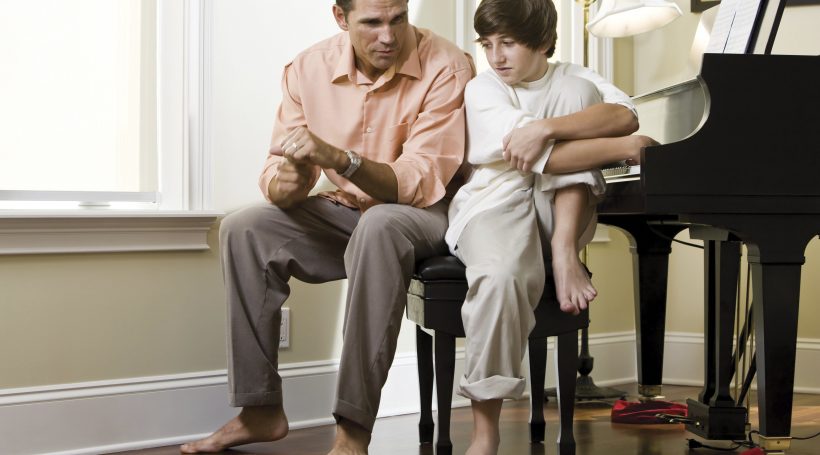Voorhees mom Heidi Weinroth found an in to talk to her daughter about the dangers of marijuana when the then seventh-grader mentioned that kids she knew from school were smoking pot.
“She brought up that kids were talking about dab pens – a vape that looks like a pen – with marijuana in it,” Weinroth says. “She said she wasn’t doing it, but she heard others were smoking them. That started a conversation about how to get out of uncomfortable conversations.”
As state lawmakers edge closer to legalizing cannabis for recreational purposes, such discussions are likely to play out in households across South Jersey. For parents who grew up in an age when pot was outlawed – but not necessarily hard to obtain and often romanticized in popular culture – knowing what to say about smoking marijuana is not so clear cut. It’s not out of the question to support legalized marijuana but also be concerned about the message it sends to teens, says Katherine Prihoda, assistant clinical professor at Rutgers School of Nursing in Camden.
Until recently, pointing out that pot was illegal was an obvious starting point, says Prihoda. But that’s no longer true.
“Parents who have smoked marijuana themselves may be stressing over what to tell their kids about pot. You can’t say it’s illegal anymore,” she says.
Tricky as it may be, such conversations are both important and timely, especially as awareness and momentum for the sale of cannabis grows, she says. Here are tips to help get the conversation off the ground.
START YOUNG
Introduce the topic when your child is in grade school. A natural way may be mentioning a recent news story or casually asking if your child sees other kids talk about pot in school, says Prihoda.
“By the time your child is in middle school, he or she will interact with eighth-graders,” she says. “We want the information to come from the parents, not a peer. A lot of kids will get defensive when you direct it right at them, but when you talk in general, it’s easier to have those discussions.”
Point out that proposed legislation to make cannabis legal for adults expressly prohibits them from buying or giving pot to anyone underage. The same is also true for alcohol and tobacco products, points out Andrea Marshall, director of education at the Camden County Council on Alcoholism & Drug Abuse.
“With that in mind, when parents and caregivers talk to their children about underage drinking and tobacco use, they should also include recreational marijuana,” Marshall says.
STRESS THE FACTS
Parents may have mixed feelings about legalizing pot, but there’s no disputing scientific findings about the permanent damage marijuana use can cause to developing brains.
Prihoda suggests explaining that the component in marijuana that causes
the “high,” THC, is a psychoactive substance that directly affects a part of the brain responsible for memory, learning, attention, decision-making abilities, emotions and reaction time. That area does not fully mature until the mid-20s, she says.
“The younger you start using weed, the more problematic it is to the developing brain,” she adds. “It dulls your sensory awareness, your motor control and coordination.”
And while teens often feel invincible, facts again tell another story. Stress that approximately one in six teens who repeatedly use marijuana become addicted, says Marshall, citing data from the National Institute on Drug Abuse.
Warn them that breaking free of addiction is difficult, and pot is considered by many as a gateway drug to other substance abuse issues. Once young adults are hooked, a predictable path is giving up important activities with friends and family in favor of using marijuana, says Marshall.
SEIZE THE RIGHT MOMENT
Rather than giving a lecture, have a casual conversation when you sense your child is comfortable sharing his thoughts and feelings, says Marshall.
For Weinroth, her daughter’s willingness to talk about her discomfort with the middle-school vaping scene naturally led to a meatier discussion. And she was ready.
“She and her peers didn’t realize that vapes had nicotine in them and that nicotine is dangerous and addicting,” says Weinroth, a pediatrician. That opened the door to a more general discussion about dab pens, marijuana-laced e-cigarettes, drugs and alcohol. She also shared a news story with her daughter about kids getting sick in school when peers shared marijuana-laced candy.
“I told her I heard kids ate gummy bears with marijuana in them and asked her if that had ever happened to anyone she knew,” Weinroth says. “If someone else has done it, it takes her off the hook but opens up a chance for a conversation.”
“I told her she can always say she has to go, call me to pick her up and blame it on me,” she says.
Role playing situations where the child may feel pressured into trying weed is a good way to prepare them for real life, says Prihoda. If your child can’t think of a good excuse, you might suggest: ‘I play sports and don’t want to be tired’ or ‘I have to be clear minded because I have a test later’ or even ‘My parents would kill me.’
Assure your child that you will support her even when she makes mistakes, Prihoda adds.
YOUR OWN HISTORY: TO TELL OR NOT TO TELL
Parents who smoked pot when they were younger may find themselves in a quandary. If you admit your use, does it give your child license to do what you did? But you may feel uncomfortable lying when you’ve always preached honesty.
Redirect the conversation, suggests Prihoda, asking, “Why is it important to know if I smoked? What I want to talk to you about is how it’s affecting your brain.”
If you have used drugs in your past, it is a personal decision whether you share that history with your kids, adds Marshall. But you can say that marijuana is significantly more potent now then it was years ago, and the consequences on our health are better understood today. Then follow that up with the science.
“You can say: ‘Agriculture has improved so much that the THC content is much higher than it was when I was younger,’” says Prihoda. “The THC in a marijuana plant in 1995 was about four percent and now it can be close to 20 percent.”
WHAT TO DO IF YOU DISCOVER YOUR KID IS USING
If your child admits to using pot, find out why. It’s hard to know which kids are going to try it because of peer pressure and which might come to rely on it more as a coping skill to deal with social anxiety or depression, says Prihoda.
“Kids will typically use in times of great stress, like parental divorce, moving and changing schools,” she says. “Going from grade school to middle school is a big stressor for kids.”
Once the child shares how he feels, it’s the parent’s job to recommend more positive alternatives to self-medication with pot. That might mean finding ways to help them avoid uncomfortable social situations, reducing stress by becoming more organized, cutting out some activities or getting help from a therapist.
“As difficult as these conversations may be,” says Marshall, “parents should focus on how much they care about their child’s health and the harmful consequences of substance use.”














